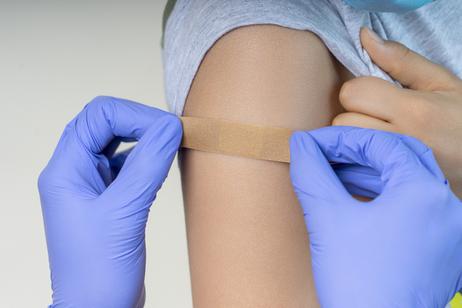I grew up when polio, whooping cough, and chicken pox were the diseases parents dreaded. I remember getting shots in August before school started. That doctor's visit always seemed to be combined with visits to the shoe store for a new pair of black leather school shoes, the department store for a new pair of grey dress shorts, white shirts, and a school tie. Yes, the Westmount Public Schools had a uniform code back then.
Fast forward to the 21st century when 99% of private schools will require your children to be vaccinated. I was curious about where things stand. Here's what I discovered.
What entity requires vaccinations?
The department of health in each state publishes a list of vaccinations required by law for children. It also will list recommended immunizations. The wording will vary from state to state, of course. For example, North Carolina's K-12 School Requirements spells out the vaccinations required at each age level. It also provides details about why a particular vaccination is required and links to further information from authoritative sources such as the Centers for Disease Control.
This video reports on the vaccinations required for children attending school.
Which vaccinations are commonly needed?
The major Los Angeles healthcare organization Cedars-Sinai offers a list of immunizations needed for students ages 7 to 12.
- 4 doses diphtheria, tetanus and pertussis (DTaP, DTP, DT, Tdap or Td); 3 doses OK if last dose was given on or after second birthday
- 4 doses polio (OPV or IPV); 3 doses OK if one was given on or after second birthday
- 1 dose measles, mumps and rubella (MMR); 2 doses required at seventh grade
- 1-2 doses varicella (chickenpox); admission at ages 7-12 need one dose; admission at ages 13-17 need two doses
- 1 dose tetanus, diphtheria and pertussis (Tdap) at seventh grade or out-of-state transfer admission at grades 8-12; 1 dose on or after the seventh birthday
Cedars-Sinai also has a comprehensive list of immunizations for children from infancy through age 6. Review it. Compare it with the list of immunizations your local authorities require. Then, discuss it with your family doctor.
Why are vaccinations required?
This question prompted several minutes of flashbacks as I thought about all the shots our daughters got back in the 70s and 80s. I don't recall ever asking this question; however, it is a commonly-asked question in the 21st century. Once again, the CDC offers authoritative answers in Making the Vaccine Decision: Addressing Common Concerns.
Childhood vaccines protect children from a variety of serious or potentially fatal diseases, including diphtheria, measles, mumps, rubella, polio, tetanus, whooping cough (pertussis) and others. If these diseases seem uncommon — or even unheard of — it's usually because these vaccines are doing their job. Source: The Mayo Clinic
When should you begin vaccinations?
Unicef offers advice from the experts in Vaccines for Children: Parents' Questions Answered. I learned something I hadn't realized about vaccinations: you should adjust the vaccination timeline according to your child's potential exposure to a specific disease. For example, if whooping cough (pertussis) shows up in your community and your child is not due for her whooping cough shot for another six months, consult your doctor and see if he recommends administering that vaccination earlier. It's the same scenario you'll find when you travel to foreign countries where you will encounter diseases not commonly found in your hometown. In anticipation of that, you will get the vaccinations necessary to protect yourself.
Where are vaccinations available?
Vaccines are available in various places, including pharmacies, municipal and county health offices, and doctors' offices. In most cases, there is no charge for vaccinations.
Immunization History
Keep immunization records in an easily-accessible safe place. Many states maintain immunization records databases. Consult your state's health department for more information. In addition, the CDC offers valuable details on Finding and Updating Vaccination Records. While your doctor and state and local health authorities will keep records of their vaccinations, keep your record of all immunizations, especially if you move frequently. I suggest using Google Sheets to keep those critical records because you can access that information anywhere at any time.
The facts
When I was a youngster growing up in Montreal, my parents never questioned the efficacy of immunizations for me and my brothers and sister. When my late wife and I were raising our children, the same approach applied. So naturally, we asked about the vaccines our kids were receiving, whether there were any after effects, etc. But we didn't argue with the doctors who were looking after us.
In the 21st century, some parents are not convinced of the efficacy of vaccines. The History of Vaccines documents the anti-vaccination movement back to the 19th century.
Some parents believe that the diseases for which we vaccinate are not very prevalent so their children are at minimal risk of contracting these diseases. For this reason, they also believe that the possible negative side effects of vaccine administration outweigh the benefits of the vaccines. Source: National Library of Medicine
Are exemptions from vaccinations permitted?
All states and the District of Columbia allow a medical exemption. A medical exemption is allowed when a child has a medical condition that prevents them from receiving a vaccine. All but three states offer nonmedical exemptions for religious or philosophical reasons. Please check with your school to learn about exemptions Source: Centers for Disease Control and Prevention
Have a legitimate reason for requesting an exemption for vaccinations. Once again, consult a medical professional.
In this TEDX Talk, Jennifer Reich shares what she learned from parents who don't vaccinate their children.
Sources for scientific information
The sources for scientific information I have in mind are sites presenting information that lay people like me can understand. Immunize.org offers a page worth bookmarking: Reliable Sources of Immunization Information: Where Parents Can Go to Find Answers! Scientific information need not be written in incomprehensible jargon using polysyllabic Latin phrases, etc. One of the podcasts I listen to from time to is This Week In Virology (TWIV ) It's easy to listen to and full of accurate information.
Sources for disinformation
Disinformation about vaccines lies in plain view anywhere you care to imagine. Social media tends to be a primary source of news and information for millions of people. Disinformation spreads quickly on social media platforms, masquerading as fact. Couple that with the reality that many people lack the basic skills to analyze information and think critically and you can see why disinformation spreads like wildfire.
Whether it is about the presidential election, climate change, or Covid-19 vaccines and the delta variant, misinformation continues to spread rampantly across social media. According to a Pew Research Service study from January, more than eight-in-ten U.S. adults (86 percent) said they get their news from a smartphone. It is easy to see why misinformation continues to spread. Source: Forbes
Read about vaccines. Understand how they work. Consult a trusted medical professional for answers to your questions.
Questions? Contact us on Facebook. @privateschoolreview















